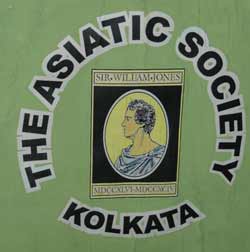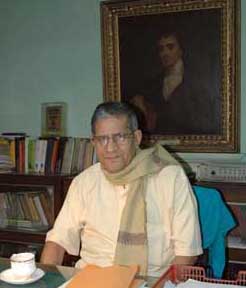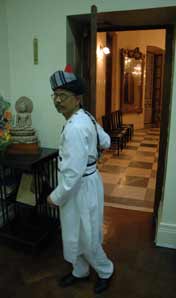SWEDISH SOUTH ASIAN STUDIES NETWORK
 Lecture
by Staffan at the Asiatic Society,
Lecture
by Staffan at the Asiatic Society,
21 November 2005
Asiatic Society web page: http://www.asiaticsocietycal.com/
 Invited to speak
by this old institution, started in 1782, located at 1, Park Street, right
in the city centre of Kolkata, Staffan had chosen to speak about an ongoing
panel study of 240 agricultural households in six villages along the Kaveri
in Trichy and Karur districts, a study he is currently working with. These
households were interviewed 25 years ago about economic, technical and
social conditions and they are asked the same questions again. The study,
which is undertaken by Lindberg and four colleagues, covers agricultural
economy, household economy, migration, social and political organisation.
In the lecture social transformation of local politics and gender relations
were dealt with.
Invited to speak
by this old institution, started in 1782, located at 1, Park Street, right
in the city centre of Kolkata, Staffan had chosen to speak about an ongoing
panel study of 240 agricultural households in six villages along the Kaveri
in Trichy and Karur districts, a study he is currently working with. These
households were interviewed 25 years ago about economic, technical and
social conditions and they are asked the same questions again. The study,
which is undertaken by Lindberg and four colleagues, covers agricultural
economy, household economy, migration, social and political organisation.
In the lecture social transformation of local politics and gender relations
were dealt with.
There were about 30 people in the audience and after the lecture there
were a good deal of questions and comments. The meeting was presided over
by Professor Biswanath Banerjee, President
of the Asiatic Society, and the lecture was concluded by a nice tea party
in the office of the Asiatic Society’s General Secretary, Dr. Ramakanta
Chakrabarty (photo to the left).
 Meeting
with the Governor, Mr. Gopal Krishna Gandhi
Meeting
with the Governor, Mr. Gopal Krishna Gandhi
Dr. Arild Ruud at Oslo University, former Director of the Nordic Centre in India, had introduced us to the Governor of West Bengal Mr. Gopal Krishna Gandhi who till recently was the Indian Ambassador to Norway (here seen on the photo along with Prof. Lindberg).
 We entered
the massive and imposing Raj Bhavan (that used to be the Government House
in the colonial days), with a certain respect, not being used to such
a visit, and with thoughts about the marriage of the British Colonial
system and the modern democratic India. Feelings that quickly melted in
the air when we were informally and cordially received by the governor
in his office. ‘The marriage,’ he said, ‘was not a happy
one, but the relationship had changed a great deal in the political process
after Independence.’
We entered
the massive and imposing Raj Bhavan (that used to be the Government House
in the colonial days), with a certain respect, not being used to such
a visit, and with thoughts about the marriage of the British Colonial
system and the modern democratic India. Feelings that quickly melted in
the air when we were informally and cordially received by the governor
in his office. ‘The marriage,’ he said, ‘was not a happy
one, but the relationship had changed a great deal in the political process
after Independence.’
We had an interesting discussion about the current problematic situation facing agriculture and the need for research networks to work on the many problems facing contemporary India. He was already well informed about SASNET and appreciated our work and the plan for our contact tour.
SASNET - Swedish South Asian Studies Network/Lund
University
Address: Scheelevägen 15 D, SE-223 70 Lund, Sweden
Phone: +46 46 222 73 40
Webmaster: Lars Eklund
Last updated
2006-02-07
